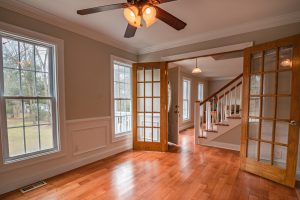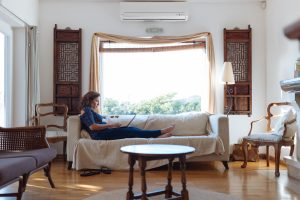The short answer is yes, your hardwood floors will darken over time. This is inevitable, although there are steps you can take to slow down this process. Have you ever moved a rug after a few months and noticed the flooring underneath the rug is lighter than the exposed part of the hardwood? You might think this is counterintuitive, as something exposed to direct sunlight usually lightens. Not the case with hardwood floors.

Photo courtesy of Pexels
Why Does Hardwood Darken?
Both direct and indirect sunlight will darken hardwood flooring over time. This is because of three factors: ultraviolet light (UV), visible light and infrared light (IR). Wood is inherently very photosensitive. The combination of these three types of light, when it reacts with hardwood finish, will slowly cause floors to change color.
Of course, the degrees to which hardwood flooring will darken depends on the type of hardwood species. Some species, such as Tigerwood flooring, react quickly to UV rays and will turn much darker, much more quickly. Other hardwoods like Hickory and Red Oak will actually become lighter and bleach, but at a slower rate than Tigerwood. This is important to take note of when you’re in the consideration process of selecting a hardwood floor for your home. In general, however, most floors will start to change color as early as three weeks after installation.
Prevention
While sunlight damage to hardwood floors is largely unavoidable, there are a few steps you can take to mitigate how much the color of your floors will change.
1. The areas of your floor covered by furniture or rugs will darken less quickly than those areas exposed to direct sunlight. If your space allows, try switching up the positioning of rugs and furniture. This will help even out the floor coloring, creating a less spotty floor overall.
2. Talk to your flooring manufacturer to see if a finish with UV inhibitors might work for your flooring type. While there is no finish that can stop the darkening process altogether, there are some finishes that will help slow the process down.
3. Try window treatments. This can be done either with window films or curtains and blinds. Again, while this won’t completely solve the problem, it can help mitigate some of the damage.

Photo courtesy of Pexels
Final Thoughts
You’re right to think about hardwood flooring changing over time. But instead of letting this cause you stress, try to embrace it – this is part of the beauty of having hardwood floors in the first place. While there are some preventative measures you can take, try to embrace the change. Also, talk with your flooring manufacturer beforehand to make sure you select the wood that’s right for your home – you want to know what you’re getting into before you install.